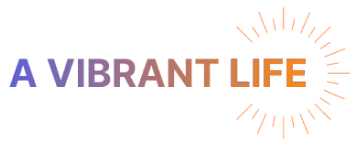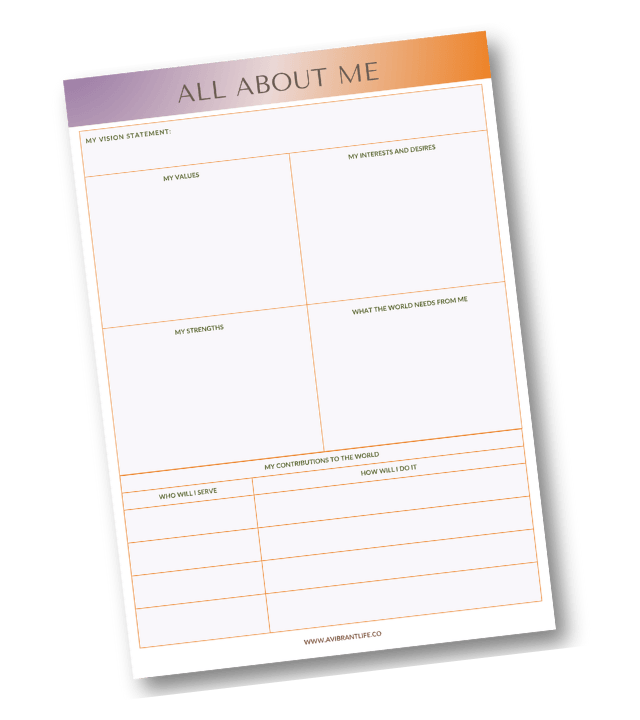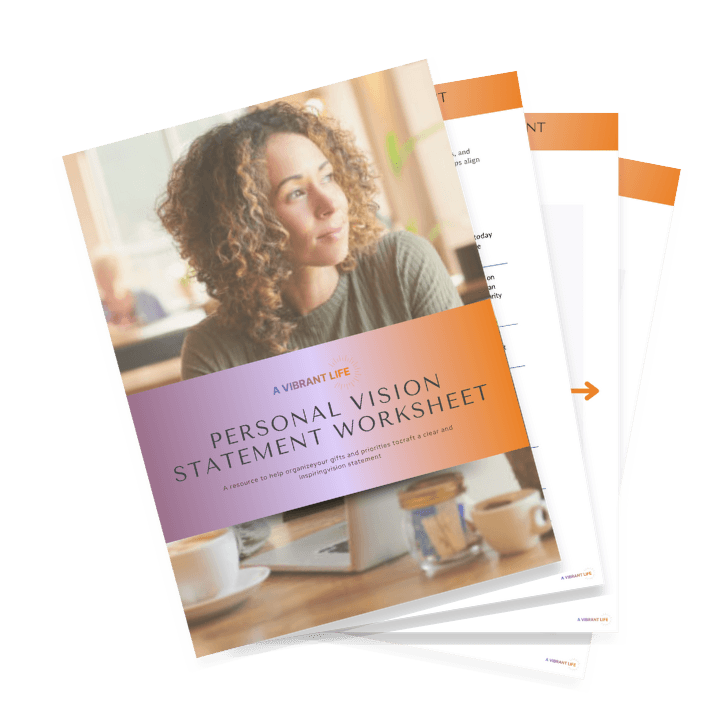All About Me: A Worksheet For Meaningful Self Reflection
Who are you?
It’s one of life’s most essential questions, yet the answer often feels elusive. Many of us default to the easiest details: where we were born, what we do for work, or who we share our lives with. These stories are comfortable and familiar, rehearsed to the point they roll off the tongue effortlessly. They help us navigate social situations and make introductions easier, but they only scratch the surface. Beneath those answers lies a deeper truth—one we rarely explore because comfort, though enticing, can keep us from truly knowing ourselves.
But here’s the truth: avoiding those deeper conversations with ourselves means we miss out on an intimate relationship with the one person who’s been with us through everything—ourselves. Let’s look at why this happens and how we can change it.
Why don’t we know more about ourselves?
Fear Life isn’t perfect. Most of us carry wounds or have experienced trauma, and revisiting those moments can be painful. It may feel easier to keep those memories tucked away. But those experiences shaped you—they hold clues to your resilience, your growth, and even your values. Reflecting on them isn’t about reliving pain; it’s about understanding. Research in positive psychology highlights the value of post-traumatic growth, which refers to the personal transformation that occurs when we process challenges and find meaning in our struggles.
Time We live in a world that rarely stops moving, and we feel pressured to keep up. Who has time to sit quietly and reflect? Even in conversation, pauses and uncertainty feel awkward. Instead of meandering through meaningful thoughts, we rush to fill the silence. But when we make time for reflection—even small, mindful moments—we create space for curiosity and discovery. According to studies on mindfulness, even five minutes of daily reflection can improve mental clarity and emotional well-being.
Effort Let’s be honest: we’re tired. The demands of everyday life can leave us drained, and digging into our emotions or thoughts can feel like one more thing on the to-do list. But much like physical fitness requires consistent effort, nurturing your mental and emotional well-being takes commitment. Positive psychology teaches us that intentional activities like gratitude journaling or strengths-based reflection can boost motivation and foster lasting happiness.
Social Norms Our society prioritizes external milestones: graduating, finding a job, starting a family. From a young age, we’re often discouraged from asking too many questions, especially of ourselves. Instead, we’re taught to follow the accepted path. But curiosity—about your desires, values, and passions—isn’t just a rebellious act. It’s the key to a fulfilling life. Research shows that greater self-awareness correlates with higher levels of satisfaction and achievement, as individuals are better equipped to make choices aligned with their authentic selves.
What are the benefits of self-awareness?
So why does it matter? Knowing yourself at a deeper level opens doors to possibilities you might not have imagined.
1. Alignment
When your actions reflect your values, strengths, and goals, you experience a sense of alignment that propels you forward. This isn’t just intuitive; studies in psychological congruence suggest that individuals who act in accordance with their personal values report higher levels of satisfaction and lower stress levels (Sheldon & Elliot, 1999). Living authentically allows you to focus your energy on what truly matters, without the mental friction of pretending to be something you’re not.
2. Meaningful Connections
Whether it’s your career, relationships, or hobbies, self-awareness helps you choose pursuits that genuinely resonate with you. You’ll invest time and energy into what feels important, rather than what’s expected. Self-awareness deepens your understanding of what’s important to you, which makes it easier to cultivate relationships that resonate. According to research on emotional intelligence by Goleman (1995), self-awareness is foundational to understanding and managing emotions. This skill not only helps you connect with others on a deeper level but also fosters trust and empathy, strengthening your relationships over time.
3. Well-Being
Self-awareness is a form of self-care. Understanding your needs, desires, and boundaries makes it easier to prioritize your mental, emotional, and physical health. When you’re aware of your emotional and mental needs, it’s easier to prioritize self-care. Positive psychology emphasizes the role of self-awareness in fostering psychological resilience. For example, mindfulness practices—which cultivate self-awareness—are associated with reduced anxiety and depression (Kabat-Zinn, 2003). By understanding yourself, you make decisions that nurture your overall well-being.
4. Deeper Relationships
When you know yourself, you can share your authentic self with others. This fosters stronger, more meaningful connections, because you’re not hiding behind rehearsed answers or societal expectations.
5. Better Decisions
Self-awareness sharpens your ability to make choices that align with your long-term goals. Research published in The Journal of Personality and Social Psychology highlights that self-aware individuals are better at recognizing cognitive biases and evaluating their own thought processes (Wilson & Dunn, 2004). This clarity leads to more informed, intentional decisions that keep you on track toward your aspirations.
6. Increased Motivation
When you understand your strengths, passions, and values, it’s easier to stay motivated and perform at your best. A study in The Journal of Applied Psychology found that individuals with higher self-awareness are more likely to set meaningful goals and remain engaged in their work (Seligman & Csikszentmihalyi, 2000). By aligning your efforts with what excites and inspires you, you can sustain momentum and achieve greater success.
What should you know about yourself?
Think of your identity as a puzzle. Each piece represents a part of who you are, and when you put them together, they reveal your unique essence—your “special sauce.” Here are some key puzzle pieces to explore:
Your Personal Vision Statement This is a guiding declaration of who you are and who you want to become. Here's a Vision guide to figure out your next chapter.
Strengths What comes naturally to you? These are your talents—things you do better than most. When nurtured, they can set you apart.
Interests and Desires What excites you? What sparks your curiosity or makes you lose track of time? These are clues to what fulfills you.
Passions What do you feel deeply connected to? Passions often align with your core values and drive your most meaningful actions.
Values What truly matters to you? Your values guide your decisions and help you stay true to yourself.
Contributions How do your strengths, passions, and values come together to serve others? This is your opportunity to make an impact in the world.
How can you learn more about yourself?
Reflective Questions for Journaling:
What energizes me and makes me feel alive?
When have I felt most proud of myself, and why?
What do I value most in my relationships, and how can I nurture those values?
What’s one challenge I’ve overcome, and what did it teach me about myself?
Vision Boarding: Use images and words to visualize your goals, values, and passions. This creative process helps clarify your personal vision statement.
Strengths Assessments: Tools like the VIA Character Strengths Survey or CliftonStrengths can help you identify what you naturally excel at.
Mindfulness Practices: Meditation or quiet reflection allows you to tune into your emotions and become more aware of your thought patterns.
Recommended Habits for Self-Reflection:
Set a Weekly Reflection Time: Dedicate 30 minutes to review your week. Ask yourself: What went well? What could I improve?
Daily Gratitude Practice: Write down three things you’re grateful for each day to focus on the positive aspects of your life.
End-of-Day Check-In: Before bed, reflect on how your actions aligned with your values and goals.
Monthly Personal Goals Review: Revisit your goals and assess your progress, adjusting where needed.
How will you use what you learn?
When you take the time to truly know yourself, you gain clarity and confidence. You’ll understand how to spend your time and energy wisely, and you’ll feel empowered to say “no” to distractions that don’t align with your goals.
Self-awareness allows you to:
Define your career path and professional goals.
Deepen your spiritual or personal beliefs.
Build stronger, more authentic relationships.
Create a personal brand rooted in your true self.
Make intentional life decisions about family, finances, or health.
"Positive psychology suggests that people who feel connected to their strengths and values experience greater fulfillment and resilience. This clarity not only accelerates progress but also fosters a sense of peace and purpose.
Positive psychology suggests that people who feel connected to their strengths and values experience greater fulfillment and resilience. This clarity not only accelerates progress but also fosters a sense of peace and purpose.
The journey continues...
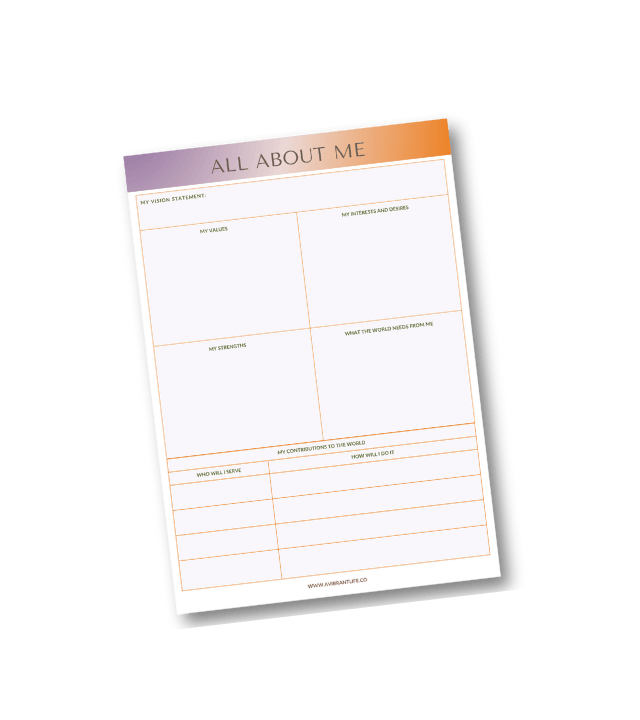

About Us
We are a community of practitioners & experts, passionate about empowering individuals & organizations with tools for growth, well-being, and transformation.
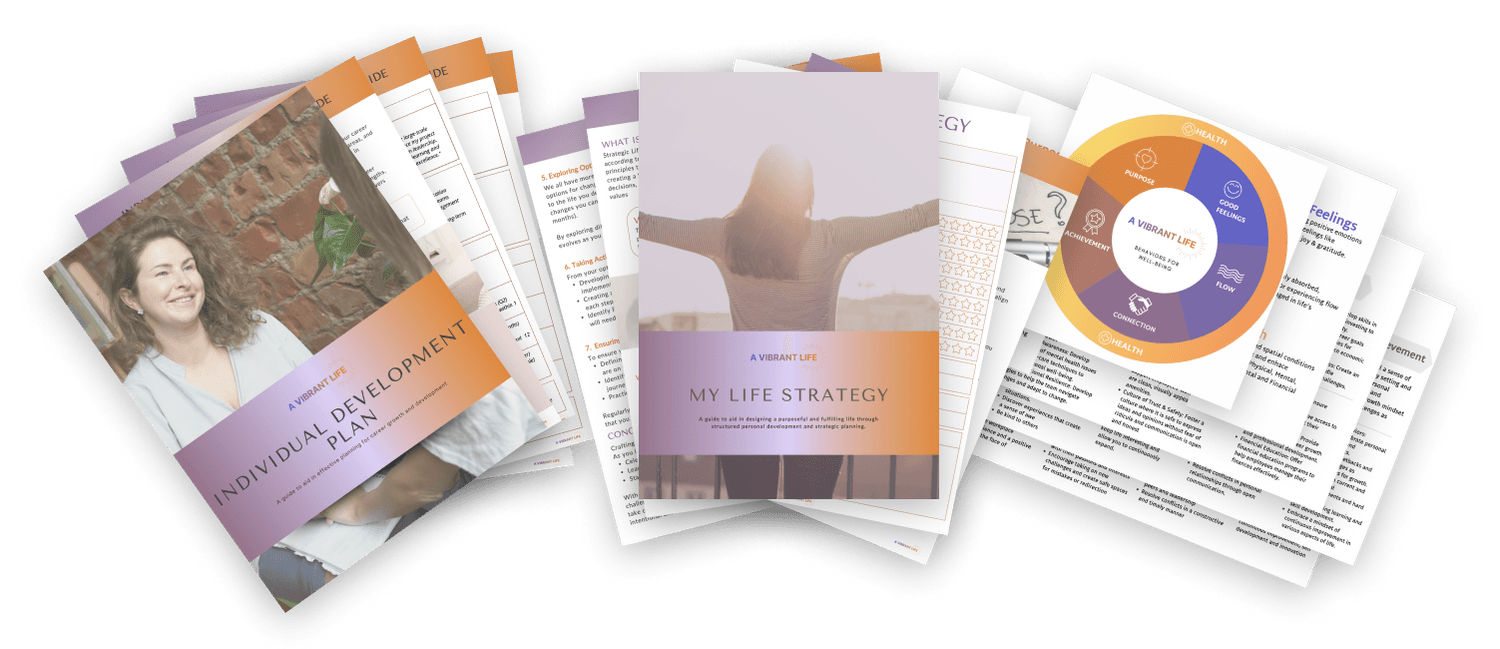
Explore Our Catalog of Transformative Products
Discover our range of expertly crafted products designed to help you achieve your goals and live a more vibrant life. Whether you're looking to advance your career, find balance, or create a thriving environment, our catalog has something for everyone.
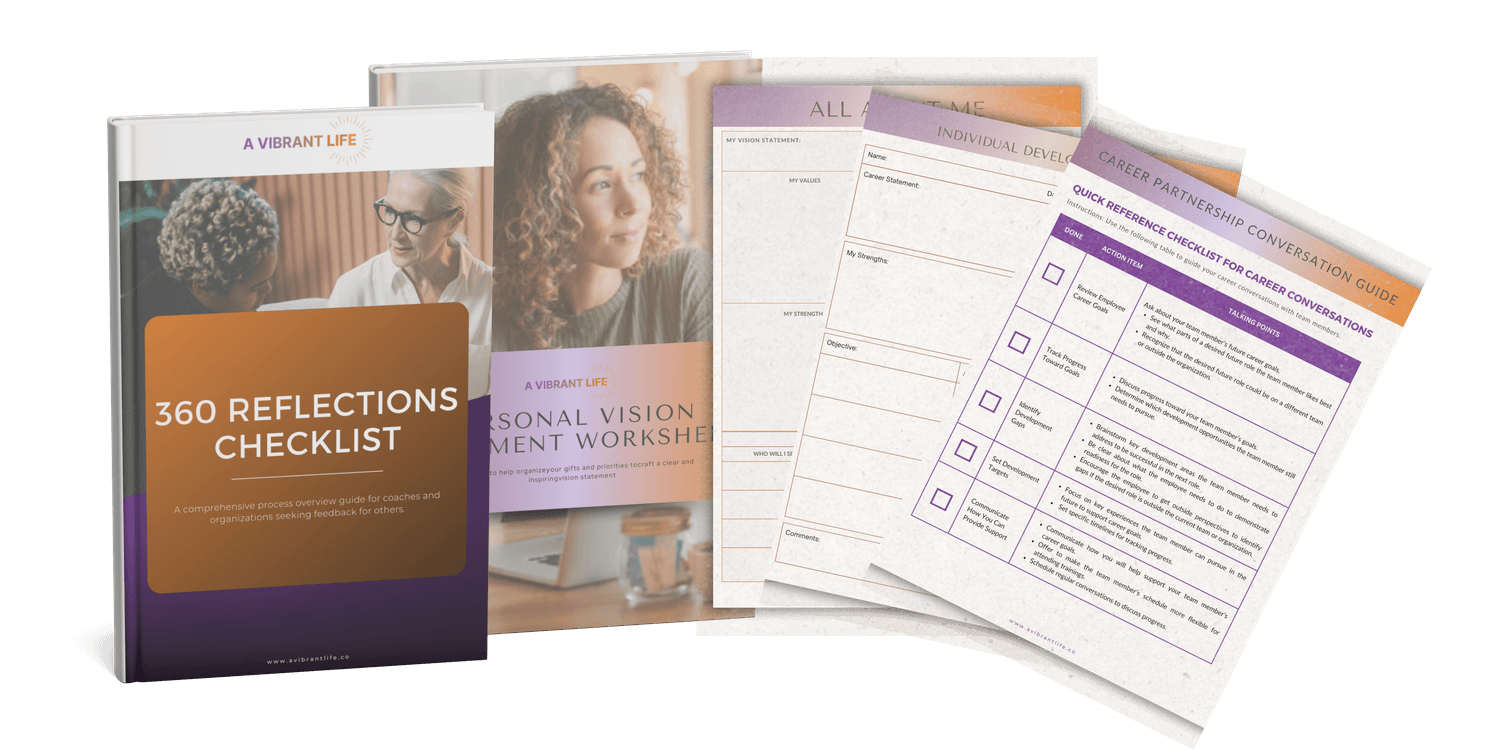
Discover Our Free Resources
Access our collection of valuable free tools, guides, and resources designed to support your personal growth journey. From starter templates to educational content, we're here to help you get started without any cost.
GET EXCLUSIVE ACCESS
Collaborate and Grow with Our HR and Coaching Community
Get exclusive content and resources designed to help you thrive both personally and professionally. Become a member of the A Vibrant Life community and gain access to expert insights, practical strategies, and a supportive network of like-minded individuals.
Your privacy is important to us. We promise to keep your email safe and never spam.
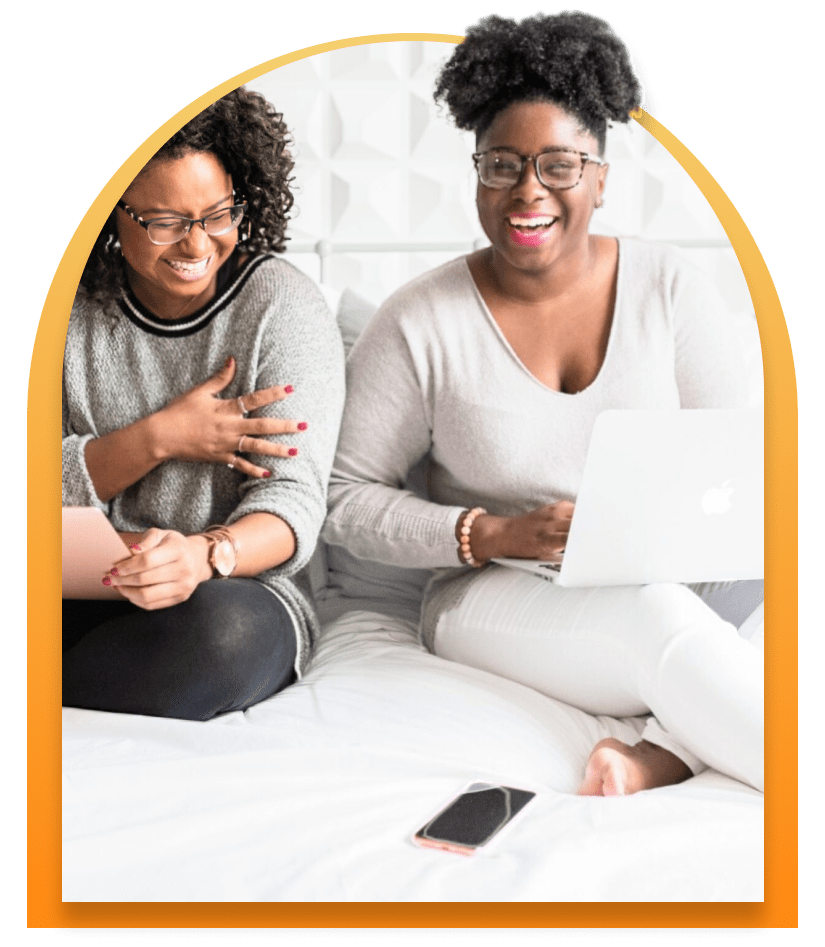
Ready to take the next step towards a vibrant life and fulfilling career?
Explore our transformative solutions tailored to meet you where you are and guide you to where you want to be.
